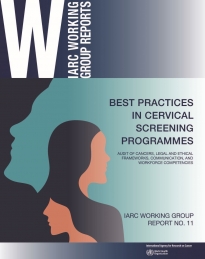
978-92-832-2520-1
Cervical cancer is a significant public health challenge globally, and cervical screening programmes play a crucial role in the prevention and early detection of this disease. Well-organized cervical screening programmes have been shown to reduce the incidence of and mortality from cervical cancer at the population level. The development of best practices for cervical screening programmes is critical to ensure that these programmes are effective, efficient, and safe for all participants.
The recommendations in this publication are the outcomes of the deliberations of three Technical Working Groups of global experts. The publication describes current best practices in the following aspects of a cervical screening programme: conducting an audit of cervical cancers; establishing legal and ethical frameworks to safeguard the interests of screening participants, health professionals, and programme managers associated with cervical screening; developing a strategy for effective and transparent communication with target populations and other stakeholders about the benefits, risks, and limitations of cervical screening; and establishing a framework for developing workforce competencies in communication.
This document will provide a valuable resource for practitioners and researchers working in cervical screening programmes and will help to ensure that these programmes operate in a safe and effective manner.
Objectives and scope of this document
Chapter 1. Audit of cervical cancers in a screening programme
Chapter 3. Effective and transparent communication with target populations and other stakeholders
Chapter 4. Development of workforce competencies in communication about cervical screening